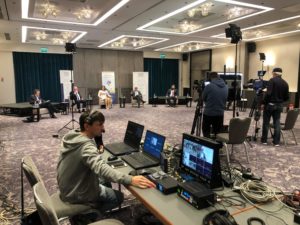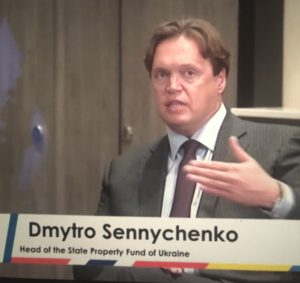
Looking ahead in our event "Emerging Ukraine: Europe's new growth engine?"
When we started to plan our activities for 2020 a year ago, the word ‘webinar’ was hardly mentioned. A year later, we are happy to announce that we successfully have hosted our largest digital event so far!
In connection with a bilateral trade commission meeting between Norway and Ukraine, the event “Emerging Ukraine: Europe’s new growth engine” took place on the 12th of November. Approximately 150 participants followed our event made up of two panel debates on the status of reform process in Ukraine and how to unlock bilateral trade potential.

Recording the first panel debate from Kyiv
Norwegian Minister of Trade and Industry, Iselin Nybø and Ukrainian Minister of Culture and Information Policy, Oleksandr Tkachenko provided the opening remarks highlighting the mutually complimentary aspects of the Norwegian and Ukrainian economy.
Did you know that in 2019, Norway was the largest foreign direct investor in Ukraine? When it comes to the future, Iselin Nybø highlighted the positive role of the reform in ensuring a levelled playing field where foreign investors are met with a fair, predictable and competitive framework.
” I don’t want Ukraine to just be a ‘promising country’, but a delivering country”

Dmytro Sennychenko, Head of the State Property Fund of Ukraine
Ukraine has long been characterized by its potential. The reform brings about concrete tools for turning this into delivery. Dmytro Sennychenko, head of the State Property Fund captured this in saying ” I don’t want Ukraine to just be a ‘promising country’, but a delivering country”. Major reform mean major changes and the first panel discussed some of the challenges and prospects that lie ahead for doing business in Ukraine. Some key points concerned the need for investors to understand Ukraine as a country in transition with a rapid changing legal and financial environment. In the last five years there have already been major improvements in the stability of the financial market, for example through the establishment of a floating exchange rate and the introduction of stabilizing financial instruments. While corporate governance efficiency still has room for improvement, we have witnessed a positive trend the last years, said Kristian Andersson, CEO of SEB bank.
Things are also developing in the legal field with new laws expected to attract further direct investment. One example is the “investment nanny” bill, which offers state assistance and oversight to large investment projects. Domestically, the land reform opens up for increased private ownership. The State Property fund is also in charge of implementing a policy releasing state-owned enterprises to the open market, having recently started the auctioning of distilleries across Ukraine (in essence Ukraine’s vinmonopol). The policy is part of the State Property Fund change to become more transparent and more business orientated. One step in this process concerns close cooperation with the National Anti-Corruption Bureau in investigating cases and clamping down on corruption.

“Emerging Ukraine” streaming live on zoom
Some Norwegian businesses with experience from doing business in Ukraine constituted the second panel discussing “how to unlock bilateral trade potential”. In Ukraine, particularly the high-tech industry has witnessed growth with Ukraine on its way to becoming a major IT-hub in Europe. In Norwegian company ITERA’s experience, IT-workers in Ukraine are agile in the way they work and possess a skill-level that is generally above the one in Norway. Seen together with the acceleration Covid-19 has brought about in the use of IT and proving wrong the perception that people “on site” is necessary, outsourcing to Ukraine is an attractive option.
As the Ukrainian economy is changing, so is the population when it comes to consumer behavior. The Norwegian Seafood Council witness an increase in exports to Ukraine and a change from pelagic products to the full range of Norwegian seafood. Ukrainian consumers are also increasingly concerned about quality, food safety and environmental issues. A concern for the environment is central in developing sustainable sources of energy. Norwegian energy company NTB took its first bite of the Ukrainian wind power market with a 400-million-euro investment in 2017. Senior vice president for Project and Development, Børge Tvorg, highlighted that while doing business in Ukraine often requires higher returns due to higher risks, NTB was confident this was feasible. And so is the chamber.
We would like to thank all our participants, speakers, partners and informational partners. We look forward to continuing working to facilitate enhanced business cooperation between Norway and Ukraine – online and offline.




